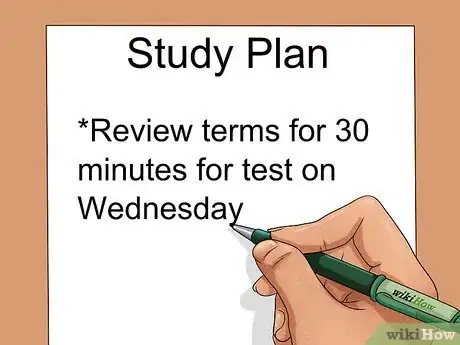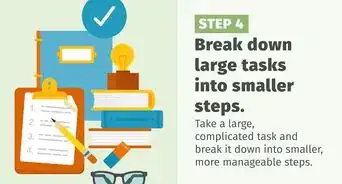This article was co-authored by Natalia S. David, PsyD. Dr. David is an Assistant Professor in Psychology at the University of Texas Southwestern Medical Center and a Psychiatry Consultant at Clements University Hospital and at Zale Lipshy University Hospital. She is a member of the Board of Behavioral Sleep Medicine, the Academy for Integrative Pain Management, and the American Psychological Association’s Division of Health Psychology. In 2017, she received the Baylor Scott & White Research Institute’s Podium Presentation Award and scholarship. She received her PsyD from Alliant International University in 2017 with an emphasis in Health Psychology.
There are 8 references cited in this article, which can be found at the bottom of the page.
This article has been viewed 16,809 times.
Having Attention Deficit Hyperactivity Disorder (ADHD) can make it difficult to sit still and study for school, especially if you are already feeling worked up about preparing for a test or exam. Studying when you have ADHD can be done effectively if you stay organized and if you maintain your focus while studying. If you struggle with studying with ADHD on your own, you may seek professional help so you can focus and do well in your studies.
Steps
Staying Organized and Prepared
-
1Put important dates in a calendar. One way you can make studying easier when you have ADHD is to stay organized and prepared to study. Start by putting all important due dates and deadlines in a calendar. This could be a physical calendar on the wall in your room, a day planner that you carry in your school bag, or a calendar you keep on your phone. Record all important dates in the calendar so you can stay organized and on top of your assignments.[1]
- If you are using a calendar on your phone, make sure you set an alarm that will remind you a day before or several hours before an assignment is due. This way, you are reminded of the assignment and have enough time to get it done.
-
2Make a list of tasks. When you have ADHD, you tend to have difficulty prioritizing your assignments. To avoid getting overwhelmed, sit down and make a list of all of your study tasks. Then, read over the list and number them in order of importance. Put the most important tasks first and the least important tasks last.[2]
- If you have a large assignment that you need to tackle, write out each step of the assignment. This will make it easier to divide the task up into manageable chunks so you do not feel overwhelmed.
- For example, if you have to do a 10 page research paper, write down each step: “Find five scholarly sources for the paper. Read the scholarly sources and pull out quotes. Outline the paper. Write each section of the paper, using the quotes from sources.”
Advertisement -
3Organize your study materials. Lay out all the materials you are going to need to study. Make sure you have all the required textbooks and reading materials. Have your study notes from class nearby. If you like to record your teacher’s lectures to refer to later, have the recordings ready and accessible. This way, you will have everything you need to dive into studying.[3]
- You may create separate folders for each subject or class you are taking. Then, you can pull out the applicable folder and stack of study materials when it is time for you to study for that subject or class.
-
4Create a study plan. Organize your time smartly so you can stay focused and prepared. Make a study plan that outlines when you are going to study for each class or subject. Break your study time by hour or half an hour. Label each hour or half an hour so you know exactly what you will be studying at any given time. This will help you stay on track and ensure you are prepared when you sit down to study.[4]
- For example, you may write down on your study plan for Monday: “Review terms for 30 minutes for test on Wednesday” or “Go over class notes for 1 hour for quiz tomorrow.”
Maintaining Your Focus
-
1Find a quiet, distraction free place to study. Staying focused when you have ADHD can be a challenge. Make studying easier by choosing a study spot that is quiet and distraction-free. You may choose to study in your room with the door closed. Or you may pick a quiet spot in your school library.[5]
- If you are studying at home, let everyone know you are studying and that you are not to be disturbed. Ask everyone in your household to be quiet and respect your need for focus.
-
2Break your studying up into chunks. When you have ADHD, you may find working intensively in short chunks may be more effective than trying to study for prolonged periods of time. Break your studying up into manageable chunks, such as 30 minutes at a time. This can help you stay focused and retain information without feeling overwhelmed or distracted.[6]
- For example, you may try studying for 30 minutes and then getting up and doing something else for 5-10 minutes. Repeat this until you get used to focusing for 30 minutes at a time, followed by short breaks.
- Instead of cramming the night before, try studying for smaller periods every day for a few days leading up to a test. For example, instead of studying for three hours the night before, try studying for 45 minutes every day for four days.[7]
-
3Walk or march while you study. Sitting still can be a challenge if you have ADHD. Do not be afraid to move around while you study. Walk or march while you read a textbook. Pace around as you memorize study terms or read over your study notes. Moving around can make focusing easier for you, especially if you tend to fidget or have trouble sitting still.[8]
- You can also try sitting on a chair that shifts or rocks to help you stay focused. Get a sitting disk, which is a lightweight portable cushion that fits on the top of a chair seat. This way, you can still move around in a gentle, controlled way and focus on studying.
-
4Read your study materials out loud. Reading out loud helps you use your auditory skills. It can also help you memorize information and retain it better. Try reading your study materials out loud, focusing on each word. Walk or march as you read. This will help you focus your attention on the study materials.[9]
- You can also try reading a section of your study materials to yourself and then paraphrasing it out loud in your own words. This can help you retain the information better and process the information more effectively.
-
5Change subjects if you start to lose focus. If you start to feel your attention start to drift, try changing subjects. This is called shifting, where you shift to a new topic or subject when you start to drift. Have a different subject or topic on hand so you can shift easily. Try shifting back and forth between assignments until all of your work is completed.[10]
- Make shifting between subjects part of your study plan so you can change subjects easily. Doing this can help you stay productive without feeling overwhelmed.
Getting Professional Help
-
1Talk to your teacher. As a student with ADHD, you are entitled to learning accommodations at your school. Talk to your teacher about accommodations in class and for your assignments that can help support you as you complete your studies. Your school may offer accommodations for you as a student with ADHD, which can help you focus and do better in your classes.[11]
- You can also talk to your school counselor and administrators at your school to find out about possible learning accommodations for students with ADHD.
- Accommodations may include getting an extension on assignment due date to accommodate your ADHD as well as different learning options, such as doing oral presentations instead of written papers to make doing assignments easier for you.
- You might ask your teacher to help you set daily or weekly goals to help you keep focused.[12]
-
2Hire a professional tutor. A professional tutor can help you learn how to study and stay focused while in school. Look for a professional tutor who has worked with students with ADHD in the past and who has experience working with students with disabilities or disorders. Ask them for guidance on how you can study better and more effectively.[13]
- The tutor may work with you one on one and share tactics that you can use to study better on your own.
-
3Find a counselor or coach. Your school or university may offer counseling services with experienced counselors, therapists, and coaches who can help you schedule and manage your time effectively. They can teach you healthy organization and study skills. They may also offer positive reinforcement that can help you build confidence.[14]
- If you are a university student, your university may offer these services as part of their psychological services or as a part of their accessibility and disability resources.
- A school counselor can help you with the process of applying for accommodations. You might qualify for help with note-taking or test-taking. You may even get permission to record lectures.
-
4Speak to your doctor. If you are still finding it hard to study with your ADHD despite adjusting your study habits, speak to your doctor. Discuss your struggles with studying and focusing with your doctor. Your doctor may refer you to a mental health counselor who can then help you identify what is holding you back. You may also be given talk therapy or medication to make it easier for you to focus.[15]
- Your doctor may also try to rule out other issues that may be causing your lack of focus, besides ADHD. Sometimes the symptoms of ADHD mimic the symptoms of anxiety and other disorders. Determining your disorder will ensure you get the proper help and support that you need to succeed in your studies.
References
- ↑ https://psychcentral.com/lib/a-toolkit-for-school-success-15-study-tips-for-students-with-adhd/
- ↑ http://www.thebestschools.org/resources/10-study-tips-add-adhd-students/
- ↑ http://disability.illinois.edu/strategiestechniques-adhd
- ↑ http://www.thebestschools.org/resources/10-study-tips-add-adhd-students/
- ↑ https://www.youtube.com/watch?v=nWqkzgWef8Q
- ↑ http://www.additudemag.com/adhd/article/8394.html
- ↑ http://www.additudemag.com/adhd/article/10602.html
- ↑ http://www.thebestschools.org/resources/10-study-tips-add-adhd-students/
- ↑ http://www.thebestschools.org/resources/10-study-tips-add-adhd-students/
- ↑ http://www.additudemag.com/adhd/article/8394.html
- ↑ https://www.ncbi.nlm.nih.gov/pmc/articles/PMC3441934/
- ↑ https://www.helpguide.org/articles/add-adhd/attention-deficit-disorder-adhd-and-school.htm
- ↑ http://disability.illinois.edu/strategiestechniques-adhd
- ↑ https://www.ncbi.nlm.nih.gov/pmc/articles/PMC3441934/
- ↑ https://www.ncbi.nlm.nih.gov/pmc/articles/PMC3441934/





















-Step-37.webp)



















































Medical Disclaimer
The content of this article is not intended to be a substitute for professional medical advice, examination, diagnosis, or treatment. You should always contact your doctor or other qualified healthcare professional before starting, changing, or stopping any kind of health treatment.
Read More...